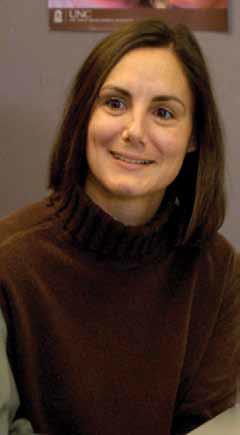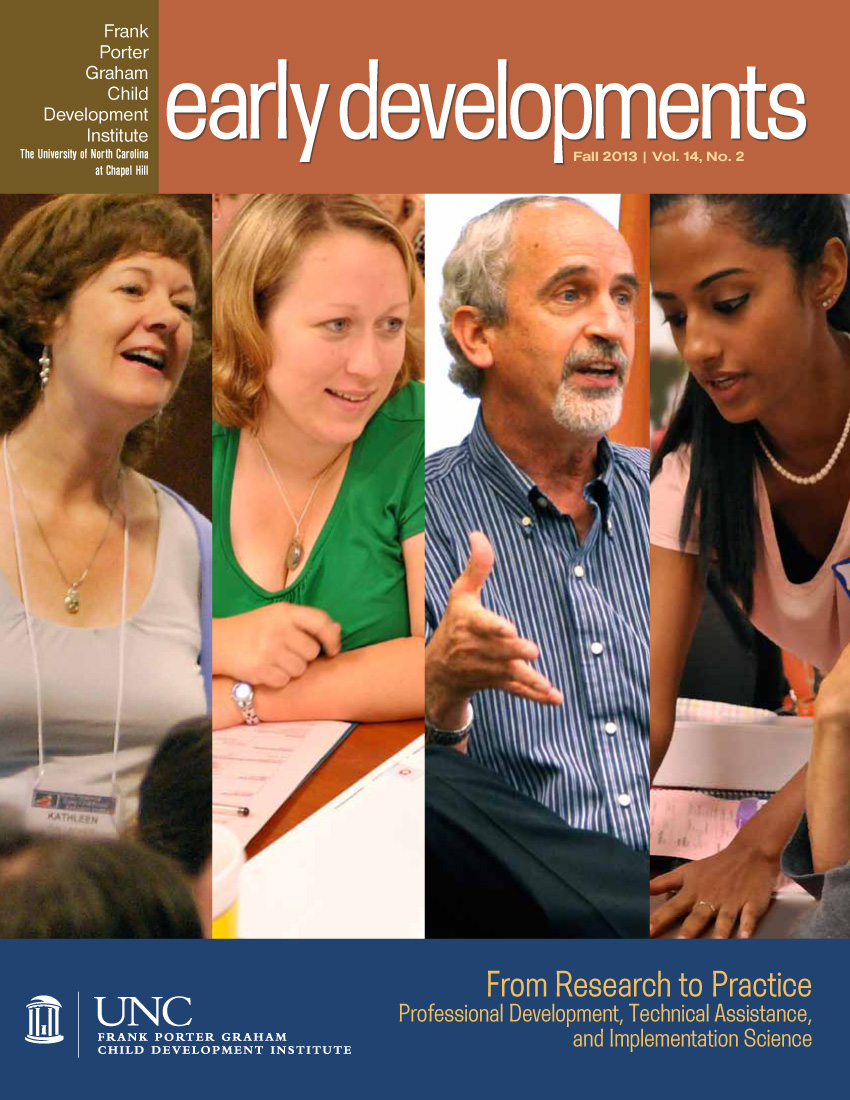42-Year Tradition Fortifies FPG's New Technical Assistance Projects
feature article from Early Developments
Helping People Do What They Do: FPG’s Four-Decade Commitment to Technical Assistance
Describing her job has been the curse of Lynne Kahn’s Thanksgiving dinners. The FPG scientist is integral in the leadership of several FPG technical assistance centers, including the Early Childhood Technical Assistance Center, the Early Childhood Outcomes Center, and the IDEA Early Childhood Data Systems TA Center, as well as the North Carolina Early Learning TA Network and six other national and state TA projects.
But Kahn says explaining the nitty-gritty of all that to family members without jargon is extremely difficult. After all, FPG’s own “Professional Development, Technical Assistance, and Implementation Science” workgroup defines TA as “an on-going negotiated relationship between TA providers and recipients, resulting in a planned series of supports and services designed to increase recipients’ capacity to improve service and/or system outcomes,” which, when intensive, “typically results in development of or changes to infrastructure, systems, policy, organization or practice, and contains iterative evaluation and feedback strategies.”
And the term “technical assistance” itself offers little help. “As far as I can tell, the word technical is as useful as the e on the end of Lynne,” she says. “It doesn’t add anything.”
For over 42 years, FPG has been committed to providing TA services, and Kahn has settled on a broad but simple definition of what that really means: helping people do whatever it is they’re trying to do more efficiently and more effectively.
Who FPG has helped, what those groups have wanted to accomplish, and how Kahn and company have provided TA have evolved over the years to meet the demands of new research and paradigm shifts. Yet, Kahn says, a two-pronged approach has remained constant—a dual focus on process and content.
In the 1970s, under director Pat Trohanis, the mission of FPG’s Technical Assistance Development System (TADS) centered on helping innovative, federally-funded early childhood initiatives conduct demonstration outreach projects, such as those designed to address early language, provide intervention for children with autism spectrum disorders, or train respite workers to relieve families. TADS was FPG’s first national early childhood TA center, helping grantees to implement projects that addressed the needs of young children with disabilities and the needs of these children’s families.
On process, TADS helped these projects identify and understand their innovations, which in turn led to developing approaches to evaluate the implementation of the innovations. TADS assisted with project management and planning, including facilitating the timing necessary to study, implement, and evaluate innovations all within the typical three-year cycle of these federal grants.
FPG also provided integral support on content. For each focus area of these grants, TADS recognized that it was important to be able to bring together experts and to facilitate interactions among those grantees who were studying the same topic, so that they could share and “push the envelope” with one another. TADS also connected expertise that didn’t have grant funding but that could offer important insight.
“We were a hub,” says Kahn, who worked closely with Trohanis as part of his core leadership staff for several TA projects at FPG. “TADS brought together those who were on the cutting-edge, investigating approaches to solving problems.”
According to Kahn, TA at FPG continued its dual focus on process and content even as the 1980s saw great advancement in the field of early childhood special education and an accompanying paradigm shift from clinic-based and separate groupings for young children with disabilities to more ntegrated settings and natural environments. New federal funding for the development of early intervention systems in individual states meant that FPG undertook a series of projects designed to support state administrators who were developing a state-coordinated system of services requiring, supporting, or encouraging effective practices provided at the ground level for families and children.
“We began morphing into areas of expertise that were more at a state-systems level,” says Kahn. What does it take to build a system? became the over-arching, driving question behind TA at FPG during this time. What infrastructures, policies, and supports did states need to implement to facilitate the use of effective practices in service delivery? What finance systems would support best practice? What kinds of personnel competencies and personnel systems would work best? What kinds of child-find systems should states utilize? How could FPG facilitate strategic planning?
 Kahn now heads several grants, which she and her colleagues call “The Trohanis TA Projects” in honor of FPG’s TA pioneer. Several of these projects support states by facilitating strategic planning and program management, as well as embedding evaluation into the implementation process.
Kahn now heads several grants, which she and her colleagues call “The Trohanis TA Projects” in honor of FPG’s TA pioneer. Several of these projects support states by facilitating strategic planning and program management, as well as embedding evaluation into the implementation process.
Christina Kasprzak (right), who serves with Kahn as co-director of FPG’s new Early Childhood Technical Assistance (ECTA) Center, says that the Trohanis TA Projects are held together by common principles and values, overlapping staff, overlapping missions, and overlapping clients—many of which are state administrators. All clients still work with services for young children with disabilities and for the families of these children.
“Under Lynne’s leadership, the number and diversity of TA projects has grown tremendously,” says Kasprzak. Despite commonalities over time and across projects, the content of the Trohanis TA Projects varies widely.
“Sometimes it’s supporting the overall implementation of IDEA, the Individuals with Disabilities Education Act—the federal law ensuring services to children with disabilities,” says Kasprzak. “Sometimes we have a very targeted focus, helping with longitudinal data systems or outcome measurement systems, for example, and sometimes we may have very small projects within a state, such as helping the North Carolina Early Intervention program with their family survey.”
After an award from the Office of Special Education Programs last fall, the ECTA Center has taken center stage among FPG’s large-scale TA projects. “Our mission is really to improve state early intervention and the early childhood special education service systems,” says Kasprzak, “as well as increasing the implementation of effective practices and enhancing outcomes for young children.”
In keeping with FPG’s tradition since the 1980s, one of the ECTA Center’s key activities focuses on systems building.
“We’re working on figuring out a cutting-edge systems framework that really helps states think about what it means to have a quality system,” says Kasprzak. The goal: to ensure effective and efficient early intervention and preschool programs for young children with disabilities.
The ECTA Center is collaborating with national, regional, and state partners and already has identified six partner states that reflect the diversity of state systems: Delaware, Idaho, Minnesota, New Jersey, Pennsylvania, and West Virginia. The ECTA Center also has created a technical workgroup composed of national technical assistance providers, researchers, and consultants to help guide the development process.
Based on literature and field input, the ECTA Center’s system framework will guide state-level coordinators and staff in evaluating their current systems and identifying areas for improvement. “We’re also looking at critical implementation components,” says Kasprzak. “We’re taking the work of implementation science and making sure we help support states in understanding what it means to use what we know are good practices for scaling up and sustaining effective practices.”
Measuring outcomes—with a focus on children and families—is central to the ECTA Center’s mission. “You don’t get good outcomes if you don’t implement effective practices at the local level,” she says. “And if we don’t have a quality system, we can’t ensure that effective practices are happening at the local level.”
In addition, the ECTA Center is providing support to the Division for Early Childhood (DEC), Council for Exceptional Children. Last year, the DEC created a Recommended Practices Commission to update and revise its recommendations and to develop a process by which Recommended Practices will be updated regularly. The DEC’s objective is to provide guidance on practices connected to better outcomes for young children with disabilities, the children’s families, and the personnel who serve them.
Major TA projects at FPG also include the 5-year-old Early Childhood Outcomes Center, which the ECTA Center is bringing under its umbrella, as well as the IDEA Early Childhood Data Systems TA Center (DaSy), which is developing coordinated systems linking data in order to answer critical questions about policy and practices and to understand what happens to kids and families in different programs over time. Among the several other TA projects at FPG are the state-funded North Carolina Early Learning TA Network and a new subcontract to support NC preschool special education in providing high-quality IDEA data in order to maximize accountability and improvement.
The current vibrancy and multifaceted nature of TA projects at FPG highlight the appropriateness of Lynne Kahn’s short-hand explanation of technical assistance. She might have coined it for the sake of smoothing over dinnertime conversation, and, to be sure, it does not do justice to the nimbleness and talent that has guided FPG’s comprehensive approach to TA for the past 42 years. And, by itself, it says nothing explicit about the betterment of outcomes for children and families that have resulted from that tradition.
But even though her definition is a great understatement, FPG’s legacy in TA certainly has been about helping others do what they’re trying to do.
This article from Early Developments draws upon Lynne Kahn and Christina Kasprzak’s presentation at FPG’s 2013 annual meeting, as well as on materials available at the ECTA Center’s website, which serves as a portal to numerous resources and to other TA projects at FPG.
Browse the contents of the new issue of Early Developments
DS

